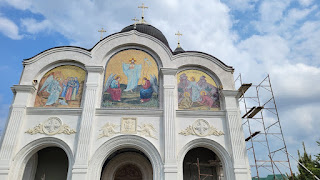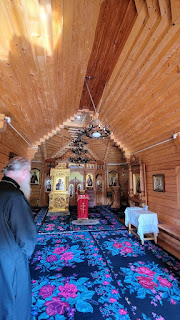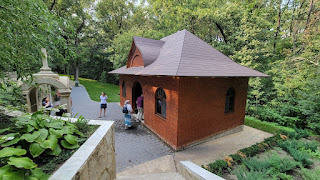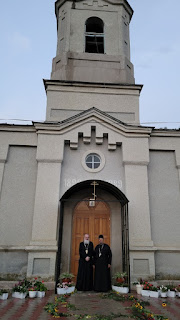On Friday, August 12th, we went to the nearby town of Căușeni, which, as best as I could tell, is pronounced "Cow-shen." As I was beginning to get some idea of how Romanian spellings translated into actual sounds, I asked Elena at one point if the "i" at the end was silent, and she said "No," it is pronounced..." and I still detected no "i" at the end, but apparently it is there very subtly, and I can't hear it.
We had breakfast on the porch. One thing that was very enjoyable was just watching the family life at Elena's parents' home. None of her siblings still live at home with her parents, but her sister, Tatiana and her husband Veceslav live nearby in the village, but not too long before we came, they had a fire that destroyed much of their house, and so their four children were staying for the most part with their grandparents, while the house was being rebuilt. One of their children, Taisia, was then about two years old, and she was very excited that her cousin Fabi was there for a visit, and so kept shouting "Faaa-biii!" She sometimes did this even when Fabi was just a few feet away, and they were both looking at each other. I started imitating this, and told Fabi that if I got to serve her wedding, I would say at the end "You may now kiss Faaa-biii!"
First, we went to an open-air market, to pick up several things that we needed to get, and then we went to the Ss. Martha and Mary Convent, which is not an ancient convent, but was founded in the 1990's. There had been a campground on this site during the Soviet period, but one day someone cut down a tree, and found that there was a cross shape in the rings of the tree. Some wondered if there had once been a monastery there, but no record exists of there having been one, but some locals said that a hermit did live in that area. It was decided to build a convent there, and in a relatively short period of time a very large convent has flourished.
When we arrived, we first got coffee in their coffee shop, which was quite good, and then we went to their bookstore, because we had a long list of things we needed to get, especially for Fr. Gregory Solis and the Holy Cross parish in Corpus Christi -- which at the time was being served once a month by Fr. David Companik, but was soon to be having regular services after Fr. Gregory's ordination later in October of that year, and so they had many things that they desperately needed to get, in order to be able to do these services. We also wanted to get some things as gifts for various friends and family back home. We didn't have enough cash on us at the time, and so most of what we were going to buy was set aside for us, and we would come back later to pick it up. They didn't have the ability to charge anything on a credit card.
It was interesting to see that they had books by Fr. Seraphim (Rose), which have been translated into Romanian, on sale. They also had a lot of books in Russian, and service books in Slavonic, because there is a sizable Russian community in Moldova. We bought a lot of silver crosses for our bookstore, because the prices were far lower than anything you can find in the United States.
We then went on to the main Church of the Convent.
A reliquary which has relics of many New Testament Saints, as well as a number of other later saints.
First we went to the lower Church, but on the way down I noticed frescos of many scenes from the Lord's passion that I do not recall seeing in other churches I have seen.
And we then went to a miraculous spring that they have there. Everyone but me went in for a dip.
After we were stuffed to the gills, we then had to hurry to our planned dinner with one of Elena's many aunts and uncles, Fr. Chiril and Matushka Maria. Fr. Chiril is the priest in the nearby village of Opaci.
When we arrived, Fr. Chiril invited us to walk to his parish Church, which is dedicated to the Feast of the Protection of the Mother of God. While we were entering, my older daughter called to do a video chat with us and our two granddaughters, the oldest of which was two at the time, but she was already very talkative. Since we previously had some trouble coordinating such calls with the time zone differences, and since I very much missed my grandbabies, I went ahead and video chatted with them, and showed them the Church as we entered. My older granddaughter said "I want to go to that Church!" I had to explain that it was a long way away from our home. I had to end the call, so I could venerate their icons. They have a miraculous Icon of the Mother of God in the parish.
After we were able to venerate the icons in the Church, we walked back to their home, and had a very nice dinner with Fr. Chiril, Matushka Maria, and one of their children, Nicu (John), although we didn't have the appetite we normally would have had. The food was wonderful, however, and after dinner, we were treated to what they called "vodka," but which was some sort of liquor made from cherries, which was also very good. My wife, who normally doesn't like alcohol in any form, liked it very much.
Poor Elena had to translate throughout the evening, and we had a lengthy discussion with Nicu, who is planning on becoming a priest like his father, about mixed marriages. Somehow we had begun to discuss "modernism," and for Nicu, the prime example of modernism was that some bishops allow Orthodox Christians to marry non-Orthodox Christians. I tried to explain why in the west, there are good reasons that this is allowed, though it is obviously not ideal. I pointed out that in Moldova, he would have to go out of his way to find a non-Orthodox woman to marry, but in the United States, it is usually the opposite. And so bishops in the west usually allow mixed marriages, as an act of economia, on the condition that the non-Orthodox spouse agrees to raise the children in the Church. Often, the non-Orthodox spouse eventually becomes Orthodox. But I explained that when this has not been allowed, the result was not that the Orthodox person moved on, and kept looking for an Orthodox mate, but that in most cases, they would end up getting married anyway, outside of the Church, without such a promise, and often this resulted in even the Orthodox spouse losing their connection with the Church. But there was something refreshing about people who live in a culture where the worst example of modernism that they encounter is bishops allowing mixed marriages.
We then said our good-byes and headed back to Sălcuța for another night.
Saturday was the last day of the trip that would not fall during the Dormition Fast, and so we enjoyed our last non-lenten breakfast, which consisted of fresh food, with much more flavor than we were used to in the United States. I believe we decided to take it easy that day prior to Vespers, because some of us were not feeling well.
Anytime there was a service in the village Church, the bells could be heard throughout Sălcuța. We drove to the Church, but most people walked, because most people don't own their own car. The simple life these people were living was so beautiful, and yet I knew that we were just across the border of the Odesa Oblast in Ukraine, and that there were many villages in Ukraine that were not very different from this one, aside from the language being spoken, and yet many of these villages have been destroyed, and their people have been scattered, and many of the people have also been killed. The evil of such wars, and what those who cause them to happen will have to answer for, became less theoretical and more concrete. I hope and pray that the war does not eventually come to Moldova, though I know that there are many people around the world, who live in gated communities, live in luxury, have never heard a shot fired in anger, and yet think of the people in places like this as mere pawns on a chess board, and would very much like to see this happen.
Sunday was the Feast of the Procession of the Cross, and so when we arrived at the Church. In their local practice, they serve Vespers on Saturday Evening, but they followed it by another service, and because I know almost no Romanian, I was not sure what it was. It may have been Small Compline. On the Holy Table was what looked like a bundle of wildflowers, formed into the shape of a big Cross, upon which was laid a decorated, wooden Cross. Outside, the temperature was warm, but not too warm. However, the Church had no air conditioning, and for what I assume are cultural reasons, the windows of the Church were kept closed (I know in some cultures have a cross breeze indoors is thought to be unhealthy). I think I only wore an epitrachelion during the service, and so it wasn't as hot as it would prove to be on Sunday morning during the Liturgy, when I would be fully vested.
The village Church has three priests: the rector is Fr. Nikolai, and the assistant priest is his younger brother, Fr. Sergei -- who is an English teacher, and so when in the altar, he was my primary means of communication. Their father, Fr. Gregory, is retired, but he still hears confessions at the Church. He is the one who baptized Elena when she was a baby. He was also one of the signers of the Moldovan Declaration of Independence and Constitution, if I remember correctly. During the Soviet period, he was sometimes harassed by the KGB, but the KGB only went so far, because I am told they feared his Matushka. After the service, when she met me and my wife, she thought my wife was my daughter -- this happens to me a lot. I explained that she was only a year and half younger, but we had not aged at the same rate.
Once, when I was still working for the State of Texas, my wife and I went out for dinner for our wedding anniversary, and when we had the picture developed, she ask me if I would like to put it in my office at work. I told her people would ask "Who is that young woman with that old man?" She framed it, I took it to work, and on the very first day, a co-worker asked if that was my daughter.
After the service, we headed back home, and then went to Elena's sister Tatiana's house for dinner. It was held outdoors, and that evening the flies were particularly aggressive. I was told that they were not normally like this, but recent rains had caused them to multiply. Flies are called "muska" in the local dialect, and Constantine and I often went "muska" hunting. My wife wished she had brought her electronic fly-swatter. On one occasion, Constantine, who had been a sniper in the Marine Corps, took a butter knife, and with perfect aim, swatted and killed a "muska" on the first try. I was quite impressed. The food, however, was one again wonderful, and the homemade wine flowed freely. But we had a Liturgy the next day, so before it got too late, we headed back home for the night.












































